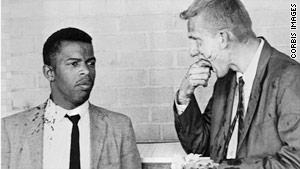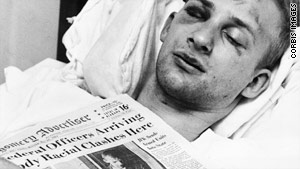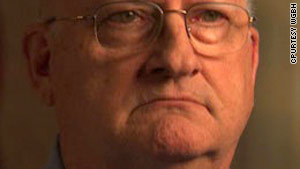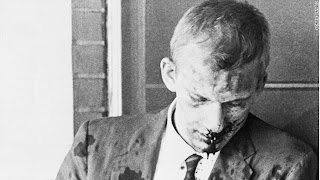By John Blake
James Zwerg's physical wounds healed after he was attacked by an Alabama mob, but the emotional wounds festered.
(CNN) -- The mob was already waiting for James Zwerg by the time the Greyhound bus eased into the station in Montgomery, Alabama.
Looking out the window, Zwerg could see men gripping baseball bats, chains and clubs. They had sealed off the streets leading to the bus station and chased away news photographers. They didn't want anyone to witness what they were about to do.
Zwerg accepted his worst fear: He was going to die today.
Only the night before, Zwerg had prayed for the strength to not strike back in anger. He was among the 18 white and black college students from Nashville who had decided to take the bus trip through the segregated South in 1961. They called themselves Freedom Riders. Their goal was to desegregate public transportation.
Zwerg had not planned to go, but the night before, some students had asked him to join them. To summon his courage, Zwerg stayed up late, reading Psalm 27, the scripture that the students had picked to read during a group prayer before their trip.
"The Lord is my light and my salvation, of whom shall I fear?" the Psalm began. But there was another passage at the end that touched Zwerg in a place the other students didn't know about: "Though my mother and father forsake me, the Lord will receive me."
Zwerg's parents had forsaken him for joining the civil rights movement. That same night, he had written a letter that was to be handed to them in case he was killed. It explained his decision to join the Freedom Riders.
Zwerg called his mother to tell her where he was going.
"Don't go. Don't go," she said. "You can't do this to your father."
"I have no choice. I have to," he said.
"You killed your father," his mother replied. Then she hung up.
The Greyhound bus doors hissed open. Zwerg had volunteered to go first. The mob swarmed him as he stepped off the bus, yelling, "Nigger lover! Nigger lover!"
Then, as the mob grabbed him, Zwerg closed his eyes and bowed his head to pray. "The Lord is my light and salvation, of whom shall I fear ... "
The mob dragged him away.
Zwerg tells the story behind the photo

James Zwerg, right, with John Lewis after the mob attacked them. Zwerg passed out soon after the photo was taken.
Zwerg looked like a bloody scarecrow. His eyes were blackened and his suit was splattered with blood. After he was hospitalized, a news crew filmed him in his hospital bed. Barely able to speak, Zwerg declared that violence wouldn't stop him or any of his friends. The Freedom Rides would go on.
Zwerg became one of the movement's first heroes. Although his physical wounds healed, the emotional ones took longer. He was wracked with guilt and depression after the beating. He drank too much, contemplated suicide, and finally had to seek therapy.
He was drawn to the Freedom Rides after he was assigned a black roommate while attending Beloit College in Wisconsin. He grew to admire his roommate and was shocked to see how the young man was treated by whites when they went out in public together. So he volunteered to be an exchange student at Fisk University in Nashville, an all-black college, for one semester. He wanted to know how it felt to be a minority.
Zwerg had gone to a city that had become a launching pad for the civil rights movement. He was swept up in the group of Nashville college students who were initiating sit-ins and Freedom Rides. He was awed by their commitment.
Zwerg's parents were unaware of the changes taking place in their son. They were enraged when they opened their local newspaper the day after he was attacked and saw the now-famous picture of their battered son on the front page.
Zwerg later tried to explain to them that what he did as a Freedom Rider was an outgrowth of what they had taught him, but they remained angry. "These are the two people who instilled my Christian beliefs, my ethics," he says, "and now they were saying, this time when I lived my faith to the fullest, they didn't accept it."
Zwerg would try to talk to his father about his decision, but they could never finish the conversation.

Even after the mob attacked James Zwerg, they followed him to the hospital. He became a media sensation.
Zwerg's anguish was compounded by his father's weak heart. He suffered a heart attack after he learned his son was attacked by a mob, and his mother had a nervous breakdown. "I had a tremendous amount of guilt," he says.
Even as the years passed and he was featured in documentaries and history books, Zwerg's parents never gave their approval. They simply stopped discussing that part of his life.
The closest he got to some sort of reconciliation was a conversation with his mother. She told him that her concern was for his dad. "She said, 'You'll never know the shock. We knew you were doing something, but we learned what happened to you from seeing your picture on the front page of the Milwaukee Journal. Until you have a child of your own, you'll never understand.' "
The iconic photo eats away at Zwerg's life
His parents' rejection erased the closeness Zwerg once felt with them. "I had a lot of anger toward them," he says. "How can they treat me this way? This was the most meaningful period of my life. How could they not understand that?"
Zwerg took out his anger on himself and on others. After the beating, he returned to college but had trouble being close to anyone. "The two people I loved the most hurt me, so, by God, I wasn't going to love anybody," Zwerg says. "I might meet a girl who I felt was special. One minute, I'd tell her that I loved her, and the next, I told her I didn't want to see her again."
Zwerg began to drink heavily during his senior year, and at one time he contemplated suicide. Depressed, he put on his jacket and walked to a pier near campus.
He still doesn't remember what happened next. "I remember going out to the pier, but I do not remember coming back," he says. "I awoke the next day in my room, and when I put on my jacket, a straight-edge razor was in a pocket. I didn't remember putting it there."
Though the aftermath of the beating caused Zwerg much emotional pain, the attack also led to one of his most profound religious experiences. He felt something during the mob attack that he still struggles to describe.
After he stepped off the bus, Zwerg says, the crowd grabbed him.
In "Parting the Waters," Taylor Branch wrote that the mob had swelled to 3,000 people and described what happened to Zwerg: "One of the men grabbed Zwerg's suitcase and smashed him in the face with it. Others slugged him to the ground, and when he was dazed beyond resistance, one man pinned Zwerg's head between his knees so that the others could take turns hitting him.'"

James Zwerg says he never felt as alive as he did when he was a Freedom Rider.
Zwerg blacked out and didn't wake up until he was in a car. The mob had continued to beat him after he was unconscious. Being unconscious saved his life, he believes now. His body was relaxed, so it took the punishment better than if he had stiffened up to protect himself. Incredibly, no Freedom Riders were killed during the mob attack.
Even after he was taken to a nearby hospital, Zwerg learned later, he was not safe. "A nurse said she drugged me the first night because there was a mob coming within a block of the hospital to lynch me," he says. "She didn't want me to be aware of anything if they got me."
Zwerg was in such shock, he doesn't remember the news crew that did make it to his hospital room. In a scene that was played in the "Eyes on the Prize" documentary, a battered Zwerg told the American public that the Freedom Rides would go on. "We will continue our journey, one way or another. We are prepared to die."
He doesn't even remember talking to anyone from his hospital bed.
Zwerg's teeth were fractured and several of his vertebrae were cracked, but he recovered. He also took steps to recover emotionally. He was torn between rejoining the Freedom Riders and attending seminary.
Then, as he was being honored by the Southern Christian Leadership Conference for his courage, he talked to the Rev. Martin Luther King Jr. about his career indecision. "He said, 'Jim, go to seminary. You'll touch a lot more lives through pastoring,' " Zwerg recalls. "Basically, that made up my mind for me."
Freedom Riders struggle on a new journey
When he entered seminary, Zwerg decided to go through six months of therapy to release the anger and guilt he felt toward his parents. He also thought about a woman he had shunned during his angry college days. "I worked a lot of this through, which made me feel much better," he says. "When I finished, I knew I wanted to see my lady again. So, I called her up that night, asked her out, and asked her to marry me."
That woman, Carolyn, said yes. They live together today in Tucson, Arizona.
Zwerg entered the ministry after the beating. But he left in 1975, dejected by the politics of his job.
At various times, he was a chamber of commerce lobbyist, an IBM manager, and a business manager at a hospice. He worked for a ministry that put people into low-cost housing. He retired in 1999.
He never found the bond he experienced with the other Freedom Riders. "Each of us was stronger because of those we were with," he says. "If I was being beaten, I knew I wasn't alone. I could endure more because I knew everybody there was giving me their strength. Even as someone else was being beaten, I would give them my strength."
Though he became a pastor, Zwerg says his most profound exposure to faith came as a Freedom Rider. "I never felt so alive theologically," he says. "My prayer life was never so meaningful. My whole awareness of the power of love when I heard King say in his last utterance, 'I've been to the mountaintop, and I've seen the Promised Land.' I know those of us who were in the movement can say we were there, too."
When I put on my jacket, a straight-edge razor was in a pocket. I didn't remember putting it there.
--James Zwerg, Freedom Rider
--James Zwerg, Freedom Rider
Many of his colleagues had the same struggles. Some couldn't keep jobs because they couldn't handle authority. One stepped in front of a bus and killed himself. Another drank himself to death. Many experienced some type of post-traumatic stress.
Zwerg questions his place in history
Zwerg says he still gets choked up about that morning in the Alabama bus station. When I ask what he feels today when he sees that photo of himself, he grows quiet.
Then he tells a story.
He says he attended a reunion at the Birmingham Civil Rights Institute and Museum in Alabama. During a ceremony, Zwerg was walking with a crowd of Freedom Rider colleagues when he saw the famous pictures of his battered face in a video and displayed on the museum wall.
"I looked at it, and what it brings back to me more than anything else is that I got so much notoriety because I was white," he says. "I looked at that picture and I thought of all the people that never get their names in a book, never get interviewed but literally had given their lives. Who the hell am I to have my picture up there?"
He was suddenly flooded with guilt. He started bawling during the ceremony as startled people looked on. Then another Freedom Rider veteran, a strapping black man named Jim Davis, walked over to Zwerg.
Zwerg's voice trembles with emotion as he recalls what Davis said. "He said, 'Jim, you don't realize that it was your words from that hospital bed that were the call to arms for the rest of us.' "
And then, as Davis wrapped his big arms around Zwerg in front of the startled crowd, the two men cried together.
Comment
© 2025 Created by Lucinda F. Boyd.
Powered by
![]()

You need to be a member of THE STREETS DON'T LOVE YOU BACK to add comments!
Join THE STREETS DON'T LOVE YOU BACK